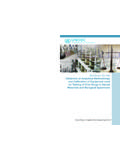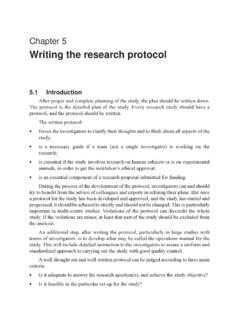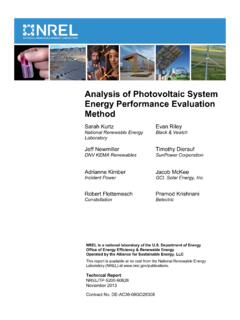Transcription of The Effect of Inquiry -based Learning Method on Students ...
1 Universal Journal of Educational Research 2(1): 37-41, 2014 DOI: The Effect of Inquiry -based Learning Method on Students '. Academic Achievement in Science Course Ali Abdi Department of Educational Sciences Payame noor University , PO BOX 19395-3697 Tehran, Iran *Corresponding Author: Copyright 2014 Horizon Research Publishing All rights reserved. Abstract The purpose of this study was to investigate the place. effects of Inquiry -based Learning Method on Students ' The Inquiry -based teaching approach is supported on academic achievement in sciences lesson. A total of 40 fifth knowledge about the Learning process that has emerged from grade Students from two different classes were involved in research (Bransford, Brown, & Cocking, 2000). In the study. They were selected through purposive sampling Inquiry -based science education, children become engaged Method . The group which was assigned as experimental in many of the activities and thinking processes that group was instructed through Inquiry -based Learning Method scientists use to produce new knowledge.
2 Science educators whereas the other group was traditionally instructed. This encourage teachers to replace traditional teacher-centered experimental study lasted eight weeks. To determine the instructional practices, such as emphasis on textbooks, effectiveness of Inquiry -based Learning Method over lectures, and scientific facts, with Inquiry -oriented traditional instruction, an achievement test about sciences approaches that (a) engage student interest in science, (b). which consisted of 30 items was administered as pre-test and provide opportunities for Students to use appropriate post-test to Students both in the experimental and control laboratory techniques to collect evidence, (c) require groups. For the statistical analysis, Analysis of Students to solve problems using logic and evidence, (d). Covariance (ANCOVA) was used. The results showed that encourage Students to conduct further study to develop more Students who were instructed through Inquiry -based Learning elaborate explanations, and (e) emphasize the importance of were achieved higher score than the ones which were writing scientific explanations on the basis of instructed through the traditional Method .
3 Evidence(secker,2002). Sandoval & Reiser(2004) pointed out in order to build the Inquiry -based classroom Keywords Inquiry -based Learning Method , Traditional environment must construct a community of practice like the Method , Sciences Course scientists work. In authentic Inquiry -based activities, the Students take action as scientists did, experiencing the process of knowing and the justification of knowledge. In contrast, the traditional classroom often looks like a 1. Introduction one-person show with a largely uninvolved learner. Traditional classes are usually dominated by direct and In the current information and technology age, when unilateral instruction. Traditional approach followers assume scientific information increases day by day technological that there is a fixed body of knowledge that the student must innovations advance rapidly, it is clearly seen that the come to know. Students are expected to blindly accept the education of science and technology plays a key role for the information they are given without questioning the instructor future of the societies and the effects of science and (Stofflett, 1998).
4 The teacher seeks to transfer thoughts and technology are seen overtly in every aspect of our lives meanings to the passive student leaving little room for (karamustafaoglu, 2010). ). Rubba and Andersen (1978), student-initiated questions, independent thought or Hurd (1970) and Klopfer (1971) indicate that the major goal interaction between Students (VAST, 1998). Even the in of science education should be developing Students activities based subjects, although activities are done in a scientific literacy . Since the goal of science education is group but do not encourage discussion or exploration of the related to very important questions which are why teach concepts involved. This tends to overlook the critical science to who teach science and at what level , there is a thinking and unifying concepts essential to true science relationship between the Method of instruction and the literacy and appreciation (Yore, 2001). This teacher-centered attainment of objectives (Baez, 1971).
5 Among these different Method of teaching also assumes that all Students have the kinds of methodologies, Inquiry Method has an important same level of background knowledge in the subject matter 38 The Effect of Inquiry -based Learning Method on Students ' Academic Achievement in Science Course and are able to absorb the material at the same pace (Lord, 2. Hypothesis 1999). There are different forms of Inquiry Learning (Bulbul,2010). There will be no significant difference in the mean gain In structured Inquiry the teacher provides the input for the achievement scores of the learners in controlled group and student with a problem to investigate along with the experimental group. procedures and materials. This type of Inquiry Learning is used to teach a specific concept, fact or skill and leads the way to open Inquiry where the student formulates his own 3. Methodology problem to investigate. An example of a structured Inquiry Learning approach is the Learning Inquiry Cycle Model, A.
6 Design of the Study based on Piagets theory of cognitive Learning (Bevevino, Dengel, & Adams, 1999). The Learning cycle model is a This research was a quasi-experimental study with teaching procedure consistent with the Inquiry nature of non-equivalent groups, which includes pre and post-test science and with the way children naturally learn (Cavallo & design with the control group. Since the classes were formed Laubach, 2001). Many versions of the Learning cycle appear at the beginning of the semester by school administration, it in science curricula with phases ranging in number from 4E was not possible to assign Students randomly to both to 5E to 7E. Regardless of the quantity of phases, every experimental and control groups. But the classes were Learning cycle has at its core the same purpose (Settlage, randomly assigned as control and experimental group. 2000). In this study, 5E Learning cycle instruction model by The experiment design pattern is shown in Figure 1.
7 In the Bybee et al., (2006) was used. It requires the instruction of pattern below, O1 is experiment group while O2 is control five discrete elements: (a) Engagement: The teacher or a group. X represents treatment Inquiry -based teaching curriculum task accesses the learners' prior knowledge and approach ( Learning cycle model). helps them become engaged in a new concept through the use of short activities that promote curiosity and elicit prior Experiment Groups Pre-test Post test knowledge. (b)Exploration: Exploration experiences provide treatment Experimental Students with a common base of activities within which O1 X O1. group current concepts (particularly misconceptions), processes, Control group O2 O2. and skills are identified and conceptual change is facilitated. (c)Explanation: The explanation phase focuses Students ' Figure 1. The experiment design pattern attention on a particular aspect of their engagement and exploration experiences and provides opportunities to B.
8 Sampling demonstrate their conceptual understanding, process skills, or behaviors. This phase also provides opportunities for The study was conducted with 20 experimental and 20. teachers to directly introduce a concept, process, or skill. control group girl Students at 5th grade in primary schools in (d)Elaboration: After receiving explanations about main Kermanshah, Iran. The selection of the school had been done ideas and terms for their Learning tasks, it is important to through purposive sampling Method . Classes were randomly involve the Students in further experiences that extend, or assigned as the control and experimental groups. In elaborate, the concepts, processes, or skills. This elaboration order to ensure the equivalence at experimental and control phase facilitates the transfer of concepts to closely related groups, Students ' previous year graduate points of but new situations. In some cases, Students may still have achievement (GPA), intelligence fields, the number of misconceptions, or they may only understand a concept in Students at the groups and pretest results were taken into terms of the exploratory experience.
9 (e)Evaluation: This is account. It was found that experimental group was the important opportunity for Students to use the skills they statistically equal to control group. have acquired and evaluate their understanding. In addition, the Students should receive feedback on the adequacy of their C. Instrument explanations. Informal evaluation can occur at the beginning and throughout the 5E sequence. The teacher can complete a Academic Achievement Test was given to both groups as formal evaluation after the elaboration phase. This is the pre-test and post-test. The test included 30 multiple-choice phase in which teachers administer assessments to determine items to measure the Students ' academic achievement. Each each Students level of understanding (Bybee et al., 2006).So, question had one correct answer and three distracters'. This the purpose of this study is to examine the effects of was a teacher made test and it has been based on the table of Inquiry -based instruction supported 5E Learning cycle on 5 specification.
10 This table was organized for 3 chapters of the grade Students ' achievements as a school subject. This study, course "sciences education". The content validity of the seeks the answer to the following question: Is teaching study was examined by two sciences teachers, one researcher science with Inquiry -based instruction supported 5E Learning and one university professor. The internal consistency cycle more effective than traditional science teaching reliability (Cronbach's alpha) of this test was found to be methods ? Universal Journal of Educational Research 2(1): 37-41, 2014 39. D. Procedures helped Students demonstrate their understanding of related concepts. Teacher guided Students toward coherent and The researcher used the following two treatments in the consistent generalizations, helps Students with distinct present study: scientific vocabulary, and provided questions that help a Taught by using 5E Learning cycle (experimental Students use this vocabulary to explain the results of their group) explorations.















